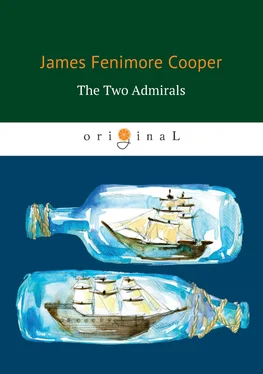Джеймс Фенимор Купер - The Two Admirals
Здесь есть возможность читать онлайн «Джеймс Фенимор Купер - The Two Admirals» — ознакомительный отрывок электронной книги совершенно бесплатно, а после прочтения отрывка купить полную версию. В некоторых случаях можно слушать аудио, скачать через торрент в формате fb2 и присутствует краткое содержание. Город: Москва, Год выпуска: 2018, ISBN: 2018, Жанр: Исторические приключения, Прочие приключения, literature_19, Морские приключения, на английском языке. Описание произведения, (предисловие) а так же отзывы посетителей доступны на портале библиотеки ЛибКат.
- Название:The Two Admirals
- Автор:
- Жанр:
- Год:2018
- Город:Москва
- ISBN:978-5-521-06651-3
- Рейтинг книги:3 / 5. Голосов: 1
-
Избранное:Добавить в избранное
- Отзывы:
-
Ваша оценка:
- 60
- 1
- 2
- 3
- 4
- 5
The Two Admirals: краткое содержание, описание и аннотация
Предлагаем к чтению аннотацию, описание, краткое содержание или предисловие (зависит от того, что написал сам автор книги «The Two Admirals»). Если вы не нашли необходимую информацию о книге — напишите в комментариях, мы постараемся отыскать её.
The Deerslayer
The Two Admirals — читать онлайн ознакомительный отрывок
Ниже представлен текст книги, разбитый по страницам. Система сохранения места последней прочитанной страницы, позволяет с удобством читать онлайн бесплатно книгу «The Two Admirals», без необходимости каждый раз заново искать на чём Вы остановились. Поставьте закладку, и сможете в любой момент перейти на страницу, на которой закончили чтение.
Интервал:
Закладка:
“Help him – help him, father!” exclaimed Mildred, covering her face with her hands, to exclude the sight of Wychecombe’s desperate struggles. “If he fall now, he will be destroyed. Oh! save him, save him, Sir Wycherly!”
But neither of those to whom she appealed, could be of any use. The nervous trembling again came over the father; and as for the baronet, age and inexperience rendered him helpless.
“Have you no rope, Mr. Dutton, to throw over my shoulders,” cried Wychecombe, suspending his exertions in pure exhaustion, still keeping all he had gained, with his head projecting outward, over the abyss beneath, and his face turned towards heaven. “Throw a rope over my shoulders, and drag my body in to the cliff.”
Dutton showed an eager desire to comply, but his nerves had not yet been excited by the usual potations, and his hands shook in a way to render it questionable whether he could perform even this simple service. But for his daughter, indeed, he would hardly have set about it intelligently. Mildred, accustomed to using the signal-halyards, procured the old line, and handed it to her father, who discovered some of his professional knowledge in his manner of using it. Doubling the halyards twice, he threw the bight over Wychecombe’s shoulders, and aided by Mildred, endeavoured to draw the body of the young man upwards and towards the cliff. But their united strength was unequal to the task, and wearied with holding on, and, indeed, unable to support his own weight any longer by so small a rope, Wychecombe felt compelled to suffer his feet to drop beneath him, and slid down again upon the ledge. Here, even his vigorous frame shook with its prodigious exertions; and he was compelled to seat himself on the shelf, and rest with his back against the cliff, to recover his self-command and strength. Mildred uttered a faint shriek as he disappeared, but was too much horror-stricken to approach the verge of the precipice to ascertain his fate.
“Be composed, Milly,” said her father, “he is safe, as you may see by the halyards; and to say the truth, the stuff holds on well. So long as the line proves true, the boy can’t fall; he has taken a double turn with the end of it round his body. Make your mind easy, girl, for I feel better now, and see my way clear. Don’t be uneasy, Sir Wycherly; we’ll have the lad safe on terra firma again, in ten minutes. I scarce know what has come over me, this morning; but I’ve not had the command of my limbs as in common. It cannot be fright, for I’ve seen too many men in danger to be disabled by that ; and I think, Milly, it must be the rheumatism, of which I’ve so often spoken, and which I’ve inherited from my poor mother, dear old soul. Do you know, Sir Wycherly, that rheumatism can be inherited like gout?”
“I dare say it may – I dare say it may, Dutton – but never mind the disease, now; get my young namesake back here on the grass, and I will hear all about it. I would give the world that I had not sent Dick to Mr. Rotherham’s this morning. Can’t we contrive to make the pony pull the boy up?”
“The traces are hardly strong enough for such work, Sir Wycherly. Have a little patience, and I will manage the whole thing, ‘ship-shape, and Brister fashion,’ as we say at sea. Halloo there, Master Wychecombe – answer my hail, and I will soon get you into deep water.”
“I’m safe on the ledge,” returned the voice of Wychecombe, from below; “I wish you would look to the signal-halyards, and see they do not chafe against the rocks, Mr. Dutton.”
“All right, sir; all right. Slack up, if you please, and let me have all the line you can, without casting off from your body. Keep fast the end for fear of accidents.”
In an instant the halyards slackened, and Dutton, who by this time had gained his self-command, though still weak and unnerved by the habits of the last fifteen years, forced the bight along the edge of the cliff, until he had brought it over a projection of the rocks, where it fastened itself. This arrangement caused the line to lead down to the part of the cliffs from which the young man had fallen, and where it was by no means difficult for a steady head and active limbs to move about and pluck flowers. It consequently remained for Wychecombe merely to regain a footing on that part of the hill-side, to ascend to the summit without difficulty. It is true he was now below the point from which he had fallen, but by swinging himself off laterally, or even by springing, aided by the line, it was not a difficult achievement to reach it, and he no sooner understood the nature of the change that had been made, than he set about attempting it. The confident manner of Dutton encouraged both the baronet and Mildred, and they drew to the cliff, again; standing near the verge, though on the part where the rocks might be descended, with less apprehension of consequences.
As soon as Wychecombe had made all his preparations, he stood on the end of the ledge, tightened the line, looked carefully for a foothold on the other side of the chasm, and made his leap. As a matter of course, the body of the young man swung readily across the space, until the line became perpendicular, and then he found a surface so broken, as to render his ascent by no means difficult, aided as he was by the halyards. Scrambling upwards, he soon rejected the aid of the line, and sprang upon the head-land. At the same instant, Mildred fell senseless on the grass.
Chapter III
“I want a hero: – an uncommon want,
When every year and month send forth a new one;
‘Till, after cloying the gazelles with cant,
The age discovers he is not the true one;”
In consequence of the unsteadiness of the father’s nerves, the duty of raising Mildred in his arms, and of carrying her to the cottage, devolved on the young man. This he did with a readiness and concern which proved how deep an interest he took in her situation, and with a power of arm which showed that his strength was increased rather than lessened by the condition into which she had fallen. So rapid was his movement, that no one saw the kiss he impressed on the palid cheek of the sweet girl, or the tender pressure with which he grasped the lifeless form. By the time he reached the door, the motion and air had begun to revive her, and Wychecombe committed her to the care of her alarmed mother, with a few hurried words of explanation. He did not leave the house, however, for a quarter of an hour, except to call out to Dutton that Mildred was reviving, and that he need be under no uneasiness on her account. Why he remained so long, we leave the reader to imagine, for the girl had been immediately taken to her own little chamber, and he saw her no more for several hours.
When our young sailor came out upon the head-land again, he found the party near the flag-staff increased to four. Dick, the groom, had returned from his errand, and Tom Wychecombe, the intended heir of the baronet, was also there, in mourning for his reputed father, the judge. This young man had become a frequent visiter to the station, of late, affecting to imbibe his uncle’s taste for sea air, and a view of the ocean. There had been several meetings between himself and his namesake, and each interview was becoming less amicable than the preceding, for a reason that was sufficiently known to the parties. When they met on the present occasion, therefore, the bows they exchanged were haughty and distant, and the glances cast at each other might have been termed hostile, were it not that a sinister irony was blended with that of Tom Wychecombe. Still, the feelings that were uppermost did not prevent the latter from speaking in an apparently friendly manner.
“They tell me, Mr. Wychecombe,” observed the judge’s heir, (for this Tom Wychecombe might legally claim to be;) “they tell me, Mr. Wychecombe, that you have been taking a lesson in your trade this morning, by swinging over the cliffs at the end of a rope? Now, that is an exploit, more to the taste of an American than to that of an Englishman, I should think. But, I dare say one is compelled to do many things in the colonies, that we never dream of at home.”
Читать дальшеИнтервал:
Закладка:
Похожие книги на «The Two Admirals»
Представляем Вашему вниманию похожие книги на «The Two Admirals» списком для выбора. Мы отобрали схожую по названию и смыслу литературу в надежде предоставить читателям больше вариантов отыскать новые, интересные, ещё непрочитанные произведения.
Обсуждение, отзывы о книге «The Two Admirals» и просто собственные мнения читателей. Оставьте ваши комментарии, напишите, что Вы думаете о произведении, его смысле или главных героях. Укажите что конкретно понравилось, а что нет, и почему Вы так считаете.












